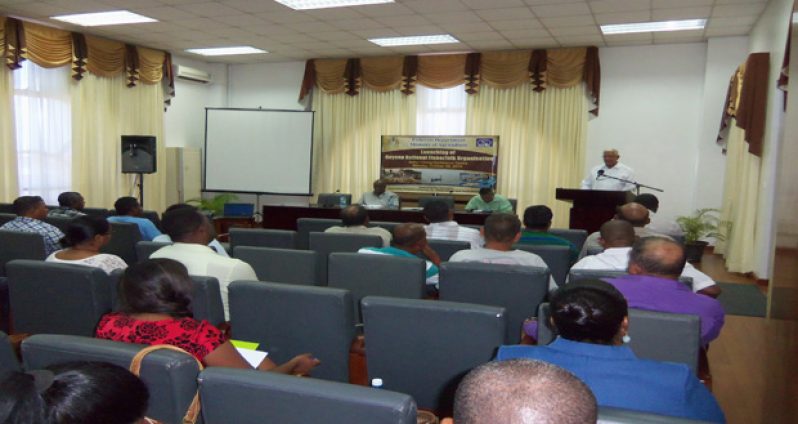AGRICULTURE Minister Noel Holder has hailed as a step in the right direction the coming together of local fisherfolk to speak with one voice.The die was officially cast yesterday with the launch of a National Fisherfolk Organisation (NFO, and election of a representative to head it, at the Arthur Chung Convention Centre (ACCC), the former Guyana International Conference Centre (GICC) at Liliendaal, on the lower East Coast of Demerara.
Speaking to the importance of having such an organisation in place, Minister Holder, in his feature address, said one of the greatest advantages is giving voice to the men and women in the fishing industry. Another is being in a position to negotiate and obtain concessions by active participation as a group.
At the last count, the fishing industry was shown to have in its employ close to 15, 000 people, an approximate 6,000 of whom are directly involved in fishing. Then there are those who benefit indirectly through fishing-related industries such as boat building and repairs, or the supply of fishing gear.
By way of underscoring the importance, economic or otherwise, of the fishing industry to the country, Minister Holder said:
“Fish provides a source of reliable, cheap animal protein, with an estimated per capita annual consumption at 25kg.”
Comparing the foregoing figure with what obtains elsewhere, he said, “This is significantly higher than the global average, which is 15.4kg. This illustrates the value of fish products to a Guyanese diet, and to Guyana’s food and nutrition security goals.”
More than that, the minister said, fish exports last year alone accounted for 18,639 tonnes, with marine production reaching 36,946 tonnes, and aquaculture production 379 tonnes.
CAUSE FOR CONCERN
What is cause for concern, however, is the steadily rising cost of inputs such as fuel and aquaculture feed, and the growing incidence of piracy.
On the issue of piracy, Minister Holder said the matter is being dealt with expeditiously, in that the government has taken an inter-agency approach to it.
“We are aware of the dangers fisherfolk face on a daily basis, and are committed to protecting you, and will work diligently to ensure we make your working environment a safer place,” Minister Holder said.
That aside, he said, “I must admit that our fishing industry in Guyana is contracting, and we need to work together to address the issues; to find solutions and save it. And we need to do this right now!
“Today’s act is a good step in the right direction; you have recognised the need to organize yourself and become more representative, as can be observed by the marine sub-sector, through the Guyana Association of Trawler Owners and Seafood Processors, which is a vibrant and strong group that has been able to negotiate and obtain numerous benefits.”
It is his fervent hope, he said, that the artisanal sub-sector of the NFO not only develop a more organised and efficient fisheries industry, but also seek to align itself with fisherfolk organisations of other CARICOM member states and the Caribbean Network of Fisherfolk Organisation as well.
NETWORKING
He made the point that network organisations are very vibrant within the region, and are so recognised they are constantly being invited to fisheries-related activities and meetings to ensure that their voices are heard.
Minister Holder said that the artisanal fishery is very important to this sub-sector, as it is the major player in providing a relatively cheap source of animal protein. Processing plants all depend on them to ensure their continued running, and export continues, he said.
“Our fishery faces numerous challenges, and one of the reasons that it is difficult to overcome these challenges is that the stakeholders are fragmented,” he said, adding:
“Indeed, we have cooperatives, but it is a known fact that most have difficulties, be it in management, infrastructure or other resources necessary for the smooth operation of such facilities.”
Underscoring that the fishing business, like any other, lies in the hands of the stakeholders, the minister said development strategies and management techniques will ensure survival for the industry. “This includes using good fishing practices, practising sustainable fishing, and being aware of the other users of marine resources,” he said.
In closing, he advised fisherfolk to play a pivotal role in facilitating stakeholders to participate in the governance of their sub-sector; in getting local issues and challenges to the national platform.
“Together, with the Fisheries Department of the Ministry of Agriculture,” he said, “we will build your capacity to achieve the long and medium-term goals envisaged.”
Permanent Secretary in the Agriculture Ministry George Jervis said fisherfolk organisations around the world are very powerful, and can speak with one voice to government.
“When you have your group, be informed, you have to be very careful that your representatives are caring enough to lobby and articulate the views of everyone; and at the end of that process, whatever views are articulated, it is related,” Jervis said in relation to the NFO’s choosing a representative.



.jpg)









